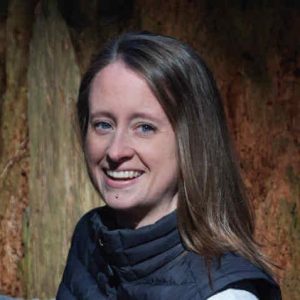PhD student Sarah Dickson-Hoyle is the second recipient of the Future Forests Fellowship, the largest award in the world for an incoming doctoral student in forestry.
The Future Forests Fellowship is made possible by a private Canadian foundation, which created it to draw attention to how forestry research impacts global issues. It is awarded to a student whose intended studies fit within one of the Faculty’s areas of excellence and who is starting their first doctoral degree.
Sarah will receive $70,000 per year for 4 years to pursue her research in fire science and the interface between ecological restoration and wild fire management. She is co-supervised by Dr. Lori Daniels and Dr. Shannon Hagerman.
Sarah received dual Bachelors degrees in Arts and Science, and a Masters degree in Forest Ecosystem Science, from the University of Melbourne, Australia. “My BA is in human geography and my BSc is in botany,” she said. “The opportunity to combine these 2 disciplines allowed me to explore the relationships between social and environmental science.”
Partway through Sarah’s undergraduate studies,the State of Victoria was hit by a series of bushfires (wildfires) in February 2009. The Black Saturday bushfires burned over 450,000 hectares, destroyed over 3,500 buildings and left 173 people dead. One of many responses to these fires was the development of new courses and research at the University of Melbourne and Sarah decided to focus her studies on fire ecology and management.
“I decided almost then and there that I wanted to work with one particular professor and pursue graduate research in fire social sciences,” she says. “I developed a tailored Masters course plan with my advisor and conducted research into community-based prescribed burning and grassland conservation in rural Victoria.”
Throughout her academic career, Sarah has been an active member of the International Forestry Students’ Association (IFSA). Through her involvement in IFSA, Sarah has attended and presented at a number of international science-policy conferences.
In 2014, Sarah attended the International Forestry Students’ Symposium hosted by students from UBC, Thompson Rivers University, and the University of Northern British Columbia. There she established connections that would eventually lead to her application for the Future Forests Fellowship.
“I stayed in touch with UBC on social media, and was on the mailing list for Branchlines,” she says. “Then I met Dean Innes at a conference in Cairns in 2017 just as applications for the Fellowship were opening.”
Sarah is currently in the design phase of her research project, which will look at how communities in the south-central Interior of BC engage in landscape management for fire mitigation or restoration.
“I’m interested in the different capacities, knowledge and histories of these communities,” she says. “It goes beyond consultation. What does it actually mean to integrate diverse forms of knowledge into fire management strategies? What existing capacities are there, and how can they be supported? How can collaborative management approaches restore both ecological and cultural values in BC’s fire-prone landscapes?”
“I’m really looking forward to going to these communities and having some deeper conversations in the near future.”
Sarah is grateful for the opportunities afforded by this Fellowship. “I feel that receiving this fellowship reflects the fact that wildfire is a pressing issue that needs multiple approaches in the ways we manage and restore fire-prone ecosystems,” she says. “In addition, this financial support gives me the time to focus exclusively on my research and to volunteer with IFSA’s training and mentoring programs.”
The Fellowship is a clear expression of the impact ofphilanthropic support on graduate-level research. TheFaculty is deeply grateful to the private foundation that made this landmark contribution.
